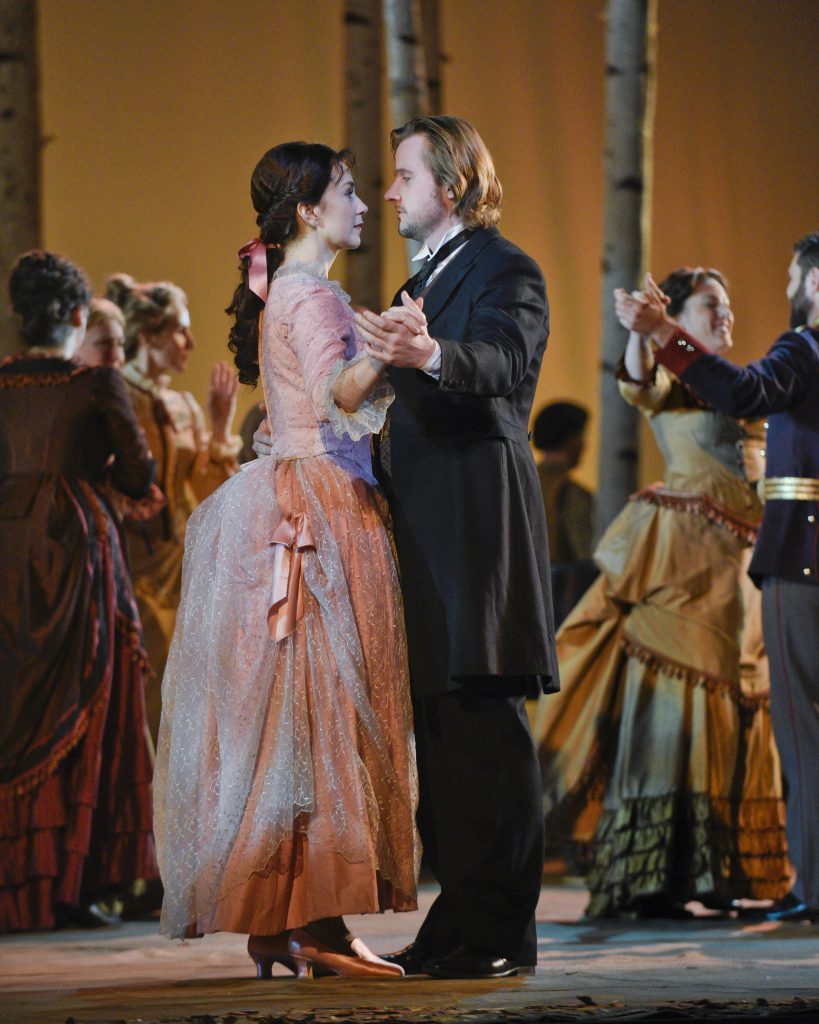Russian romance opens Dallas Opera season with Tchaikovsky’s “Onegin”

Svetlana Aksenova and Andrei Bondarenko star in Tchaikovsky’s “Eugene Onegin” at Dallas Opera. Photo: Karen Almond
Dallas Opera opened its season Friday night with Tchaikovsky’s Eugene Onegin in a sumptuous, mostly compelling, and occasionally uneven and puzzling production.
Tchaikovsky’s 1878 adaptation of Alexander Pushkin’s verse novel, is that operatic rara avis in which fidelity wins out over passion. It is an opera in scenes; the libretto clearly assumes that audiences have read Pushkin’s then wildly popular novel. Plot continuity is deemphasized in favor of peak dramatic moments.
Tatyana, a country girl, is introduced to her new neighbor Onegin by her sister Olga’s beloved, Lensky. Tatyana falls in love with Onegin and writes him a letter, declaring her love. He rejects her, telling her to be more controlled and “try to keep your feelings to yourself.” At Tatyana’s name day party, Olga dances only with Onegin rather than with her own Lensky. The jealous Lensky challenges Onegin to a duel, and murders Lensky.
Distraught at killing his friend, Onegin spends years wandering the world. He returns home to find that Tatyana has married Prince Gremin. Onegin declares his love for Tatyana, but it is too late. She rejects Onegin in favor of fidelity to her husband, leaving him to despair over his lonely fate.
As Tatyana, Svetlana Aksenova has an attractive voice,if somewhat underpowered in her big moments. The Act I letter scene is a marathon of singing in which she must be utterly vulnerable and decide whether to send the letter declaring her love for Onegin. For the most part, she manages this feat. While her acting is a bit wooden at times, her voice captures the yearning her gestures sometimes do not.
As Onegin, the dashing Andrei Bondarenko provided the evening’s highlights. His rich, remarkably consistent baritone and compelling stage presence made the audience understand how Tatyana could fall in love with him after only a single encounter. His hauteur as he rejects her in Act I and his desperation as he declares his love for her in Act III both seem eminently plausible.
Stephen Costello, as Lensky, is spectacular in his upper registers, but his voice tends to lose projection in its lower range. Similarly, Kai Rüütel as Olga has a delicious mezzo timbre, but was sometimes covered by the orchestra in her lower register.
Bass Mikhail Kazakov, as Prince Gremin, provided pathos and a pure-toned voice as Tatyana’s uxorious husband. Meredith Arwady was lush-voiced as the servant Filipievna.
Dallas Opera’s production makes an attempt at cohering the varied plot twists with narrative continuity via Alexander Lisiyansky’s sets, with mixed results. The production’s seven elaborate sets resulted in lengthy set changes which, on opening night, included the sounds of power tools emanating from behind the curtain.
The production opens in a grove of aspen trees, with Tatyana wandering through them, book in hand. A hammock and, strangely, a piano also sit in the forest. The piano appears in every scene, moving from forest to ballroom and back again, largely ignored by the cast. Anton Chekhov observed that if there is a rifle hanging on the wall at the beginning of a play, it should go off at some point.
The ballroom scene in Act III, however, was unambiguously magnificent, with leaded-glass panel walls, lined with red velvet chairs (the ubiquitous piano lurks at the back of the room). The ballroom’s enormous chandelier reappears in the last scene, lying fallen and broken in the aspen forest, presumably a symbol of lost dreams.
Costumes, by Maria Chiara Donato, are lush, running to corseted gowns for the ladies and frock coats for the gentlemen. In the Act III ballroom scene, Tatyana’s embellished dark-blue ballgown and updo crowned with jewels emphasize her newly acquired elegance as a prince’s bride in lovely and dramatically effective fashion.
The Dallas Opera Chorus, under Chorus Master Alexander Rom, was well-prepared. The choreography, created by Cooky Chiapalone, had a few opening-night missteps, but was intricate and elegant, effectively evoking 19th-century Russian upper-class life.
Emmanuel Villaume’s crisp conducting produced inconsistent playing from the Dallas Opera Orchestra, which sounded underrehearsed. Moments of glittering brilliance and precision alternated with shaky pitch. Villaume fitfully favored the orchestra at the expense of the singers, although balance improved as the evening progressed.
Eugene Onegin runs through November 5. dallasopera.org; 214-443-1000.